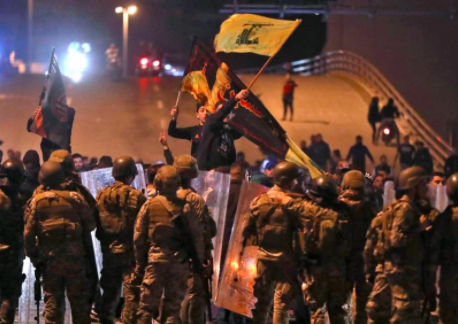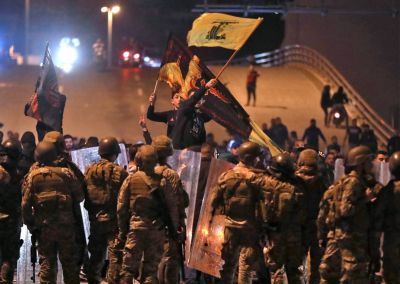
Supporters of Hezbollah and the Amal movement confront the Lebanese Army during a demonstration on the Ring Bridge in Beirut on Nov. 25, 2019 in Beirut. (Credit: AFP)
The Shiite opposition, which has been long overshadowed by Hezbollah and the Amal Movement that have monopolized Shiite representation in Parliament for decades, is preparing for the electoral battle and intends to make its way into Parliament.
This opposition, which is little known to the general public because of the parties’ stranglehold on the internal political landscape, does exist. It had already fought the 2018 elections battle, but could not stand in the face of the duo’s “steamrollers.”
Four years later, the political climate has changed drastically; the country witnessed the October 2019 popular uprising, followed by the Beirut port explosion and an acute economic and social crisis.
The traditional political parties, including Amal and Hezbollah, have since lost a part of their electoral bases. Will the Shiite independents be able to take advantage of this situation so as to win seats in the main predominantly-Shiite constituencies?
In the capital, the two Shiite seats in the Beirut II electoral district have been held since the last legislative elections by Hezbollah and Amal MPs Amin Sharri and Mohammed Khawaja.
While the independents intend to take at least one of these seats this year, the numerous opposition lists could reduce their chances. Lina Hamdan, a candidate in Beirut on MP Fouad Makhzoumi’s list, intends to fight the battle, despite the difficulties that may arise along the way.
“One of my goals is to fight against the stereotyping of Shiites and their representation,” said this activist and notorious opponent of the two Shiite parties, who did not win a seat in the 2018 elections.
“Unfortunately, the community is represented today by militias. Our battle is the battle for freedom from illegal weapons, which have brought nothing good. Hezbollah is leading us to the unknown and embroiling us in conflicts that we have nothing to do with,” Hamdan told L’Orient-Le Jour.
“We are the Lebanese resistance, not them. We are not Persians, we are Lebanese above all,” she said.
Nahida Khalil, an activist within the Madinati movement, who is also running for one of the Shiite seats in the capital, denounced what they described as Hezbollah’s control over all aspects of daily life.
“There is certainly opposition within the Shiite community, but even the state is unable to oppose the duo. What has led us to the situation we are in is the mini-state that has established itself at the expense of the state. We are trying to confront them as much as possible,” the candidate said.
In the South, the secularists are making themselves heard
In the south of the country, which is considered the undisputed stronghold of the Shiite tandem, several dissident voices have been raised in recent weeks. Numerous meetings were held by the secular clubs of Saida and Nabatieh, as well as by the Cultural Forum of Tyre, an institution that has brought together the area’s intellectuals since the 1990s.
As a sign of a change in mentality, these groups decided to support the candidacy of Ali Khalifeh, an independent, university teacher and political activist, who is running in the South II (Sour-Zahrani) district, which is one of the most difficult to compete in, as it is considered the Amal Movement’s stronghold in the South.
With 14 seats to be filled by Shiite candidates, divided between six seats for the South II constituency (Sour-Zahrani) and eight for the South III constituency (Nabatieh, Bint Jbeil, Marjayoun and Hasbaya), the South hosts difficult battles to be fought by Shiite candidates, particularly since the electoral threshold is very high there.
While Khalifeh hopes to break through so as to secure at least one seat, he is aware of how hard it is to be accepted by voters.
“People are increasingly resentful at the Shiite tandem, but it takes courage to say so. We are trying to raise awareness among them of the possibility for an alternative to exist,” Khalifeh told L’Orient-Le Jour.
“Hezbollah’s religious ideology, its dress codes and its institutions do not resemble the southerners’ culture. It has filled the void left by an absent state and applied a model imported from elsewhere,” Khalifeh said.
“We want the Lebanese state to defend us, not Hezbollah,” he added. He also believes that the only way to win seats is “to form a unified opposition and encourage the people to vote in large numbers.”
But will the Shiite parties allow the emergence of an opposition capable of challenging its hegemony in the South? Nothing is less certain for journalist Ali el-Amine, who warned against intimidation by the pro-Iran party.
He himself paid the price in 2018, when he was a candidate in Bint Jbeil. Amine, who is known to be a Hezbollah opponent, was assaulted in his village on the sidelines of the elections.
“Hezbollah is using an increasingly threatening tone because it sees that it is losing a lot of support within the Christian, Druze and Sunni communities,” Amine said.
“It is therefore tightening its grip on its own community because it now considers that the Shiites are going through an existential crisis. So it cannot allow any derailment,” Amine said.
“We already know who will be the big winner in the elections, but there may be a breakthrough if the oppositionists reach a basic understanding and cooperation. If they manage to do so, I think it will be possible to have two independent Shiite MPs in Sour or Nabatieh,” he continued.
Resentment in the Bekaa
In the Bekaa Valley, where eight Shiite seats are at stake, the battle also looks complicated for the protest movement, which is beginning to be intimidated.
“Confirmed or potential candidates are attacked on social media by Hezbollah’s supporters. Some are being accused of collaborating with Israel or of being against the party’s resistance,” journalist Osama Kadri, a specialist in legislative elections in the Bekaa Valley, said.
Despite these difficult conditions, to say the least, several opposition lists are beginning to be formed, according to the journalist, including in Baalbeck-Hermel (Bekaa III, with six Shiite seats), including a list chaired by Sheikh Abbas Jawhari, who is known for his opposition to Hezbollah.
“Several independent candidates have joined Sheikh Jawhari because they question the Shiite tandem’s performance. The Baalbeck-Hermel clans are particularly angry, as the area’s insecurity is sponsored by the Amal and Hezbollah security apparatus. This anger may well be reflected in the ballot box,” Kadri said.
“Many young people in the area have actively participated in the October 2019 ‘thawra’. If all these lists can agree, I think that the opposition will secure at least two Shiite seats in the area,” he added.
While most opponents seem to agree on the need to disarm Hezbollah, others prefer moderate rhetoric on this issue.
Some of these candidates, therefore, differentiate between Hezbollah’s political discourse and its armed resistance against Israel. They include candidates of Charbel Nahas’ Citizens in a State, and the Lebanese Communist Party, which criticizes Hezbollah above all for providing cover for corruption and believe that its weapons should be used to protect the country.
Other independent candidates, including Firas Abou Hamdan (Zahle, Bekaa I), whose uncle is former Amal MP Mahmoud Abou Hamdan, are keen not to question the military arsenal, even if they criticize the authorities’ negligence.
“I think everyone is convinced that there is a need to resist Israel,” the candidate told L’Orient-Le Jour.
“I am not against Hezbollah or Amal. I do not take a stand against anyone, I am proud of my relations with everyone. On the other hand, criticisms or blame is directed at some of the ruling parties’ actions. None of them has been up to the task,” Abu Hamdan said.
“I want to represent moderation and express myself in a democratic way. Moreover, in my case, no one can accuse me of being close to the embassies,” the candidate said, in reference to the Shiite independents who are being accused of being close to Western regimes and nicknamed the “Shiites of the embassies.”
Despite his moderate discourse, Abou Hamdan does not seem to convince the pro-Iran party of all that, since the latter has finally decided to designate its own candidate in the district.
“Hezbollah is trying to torpedo Abu Hamdan’s candidacy. It announced his cousin Rami Abu Hamdan as its candidate on its list in order to sow discord within the family and reduce his chances of being elected,” Kadri said.
As for Western Bekaa (Bekaa II), the journalist noted that “the only Shiite seat in this constituency could once again go to Amal’s candidate, Kabalan Kabalan, in the absence of serious competition,” he said. “There is a real shortage of candidates in this constituency,” he added.
Amine also recognized that “in general, there are not as many independent candidates in the Bekaa as we had hoped…The atmosphere is not very encouraging because of the economic crisis. You need to have the financial means to file for public office and fight the battle. In addition, many believe that the elections will not change anything,” he said.
This article was originally published in French in L'Orient-Le Jour.
